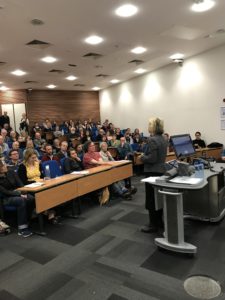
Two weeks ago I was fortunate enough to be able to attend the ‘What Would a Zero Carbon City Look Like?’ talk with Natalie Bennet, organised by the Global Systems Institute and Transition Exeter. The event was well attended, with the lecture theatre packed full, and some concern from organisers that too many people would turn up for the number of seats available.
It was wonderful to see so many students and residents taking an interest in making our cities more environmentally friendly. Natalie said very early on that when discussing climate problems she aims to focus on hope, and the diverse audience certainly perpetuated that feeling. It often seems as though there is no dialogue between students and the local community in Exeter, so it was great to see this common interest in tackling climate change; and a sign, surely, that collaboration between students and Exeter’s permanent residents could bring Exeter closer to ending its dependence on carbon.
The event highlighted a range of initiatives that aim to achieve this target. We first heard from Transition Exeter about the range of community projects that they oversee, all aiming to reduce Exeter’s carbon consumption. Their projects, which offer creative ways of reducing carbon dependency, are definitely something to check out. This was followed by a notice from students involved in Youth Strike for Climate, who at the time were helping to organise the Fridays for Future school strike which took place on March 15, 2019. These school strikes, which have now happened twice in Exeter, are part of a much broader movement aiming to pressure local and central governments to take more decisive action to keep the global temperature rise below 1.5°C and prevent the climate disaster that we are otherwise heading towards.

It was then Natalie’s turn to speak, and her message was both insightful and uplifting. Without diminishing the dangers of the impending climate catastrophe, she presented its prevention as achievable. She cited studies that demonstrated the feasibility of reducing our carbon consumption and the positive effects of such initiatives on society as well as the environment. Importantly, she made it obvious that instead of framing sustainability in terms of sacrifice, we should instead look forward to the benefits that it will bring to our society.
Progress towards a zero carbon city can be gradual and organic; relying more on buses, cycling, and walking while reducing the number of cars in use, pedestrianizing roads, and shopping at independent shops that source their produces locally. Of course engagement and active support from governments would be key to the success of this initiative. We would need to insulate all homes to reduce dependency on heating, increase the accessibility of public transport, and ensure that the interests of local businesses were protected over those of international corporations.
The benefits of reducing our dependence on carbon would be immense. Apart from helping us reduce the rate of human-caused climate change, there would be more noticeable and local benefits. Anyone who has walked or driven through Exeter at rush hour will know how congested the roads are. Relying on buses or walking would reduce traffic, making public transport more efficient and our streets safer. Walking and cycling would also be beneficial to our physical health, increasing the time we spend exercising while reducing the pollution and congestion on our streets. Depending on local businesses would ensure that more capital remained in the local economy, stimulating entrepreneurship and projects that supported and were responsive to the needs of the local community. A message which I found particularly inspiring was that zero carbon cities are dependent on everyone feeling empowered to work with their neighbours and colleagues to build a city that they wish to have. This collaboration and support within the community is truly something to aspire to.
The talk was followed by a long Q&A session which helped to highlight local concerns about the viability of a zero carbon Exeter. Questions were asked about how to best encourage shopping in local and independent shops, establish a circular economy, and introduce sustainability and conservation into school curriculums. Concerns were raised over the alternatives to carbon and the problems relating to the necessity of travel and the expense and inaccessibility of public transport. There was considerable interest in how to best promote making Exeter a zero carbon city, and how viable such a project was. A dominant theme in Natalie’s answers was that progress towards zero carbon was more dependent on institutional changes than on individuals’ behaviour such as giving up meat or single use plastic. She encouraged living sustainably, but her focus was definitely on the importance of campaigning for institutional change that would make the move towards zero carbon cities possible.
Campaigning, of course, sounds difficult and time consuming, but there is evidence that getting more people involved would not be hard. The Youth Strike for Climate event, which took place on March 15, was motivated by the actions of the inspiring teenager and now a Nobel peace prize nominee, Greta Thunberg. Her solitary protest in front of the Swedish parliament has developed into a school strike which took place in 125 countries and involved more than a million students. So small challenges to institutional inaction can lead to big changes, and there is clearly an appetite for environmental change. It can be seen internationally, but also locally, in the lecture theatre where a group of people gathered to listen about how to make their city a zero carbon city. So sharing the urgent message of climate change, organising, and petitioning governing bodies for more resolute action is definitely something that the inhabitants of Exeter can and should do.
Malwina Grzesikiewicz, University of Exeter Student
